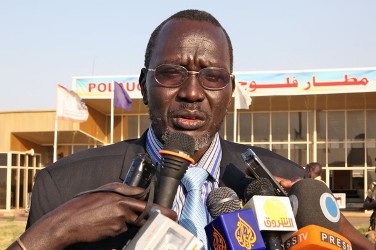South Sudan says optimistic of resolving oil transit fees with Khartoum
March 26, 2016 (JUBA) – South Sudan’s petroleum minister, Stephen Dhieu Dau says he is optimistic the young nation will overcome the difficulties being experienced in the behind the scene negotiations with Sudan over the transit fees for transporting crude oil to international markets.

Dau explained that oil prices have slumped by more than 70% to nearly $30 a barrel over the past 18 months as the world petroleum body (OPEC), led by top producers, sought to drive higher-cost producers out of the market by refusing to cut production despite a supply glut.
He said his ministry plans to venture in to the mining Spector for exports while working to resume production in Unity state to supplement production in Upper Nile state.
The Sudanese government said in January that it had undertaken technical measures after South Sudan had proposed a possible shut down of oil production early this year.
The Sudanese finance minister, Badr al-Din Mahmoud was quoted saying South Sudan had failed to pay the agreed oil transit fees, forcing the Khartoum government to take its share in kind, according to a Cooperation Agreement signed between the two countries.
In August 2013, South Sudan agreed to pay to Khartoum $9.10 for the oil produced in Upper Nile state and $11 for that of Unity state which produces some 20% of South Sudan’s oil. Also Juba agreed to pay the Transitional Financial Assistance (TFA) to the average of the agreed oil transportation fees.
Mahmoud, however, said besides the oil transportation fees ($9.10 for the oil produced in the Upper Nile or $11 for the oil of Unity state) the fees ($ 25) meant to the repayment of a $3 billion compensatory package that Juba agreed to pay Khartoum.
South Sudan’s petroleum ministry earlier threatened to shut down its oil fields in Upper Nile state, should the Sudanese government reject its request to lower the oil transit fees.
The price of crude oil is currently at $29 dollars per barrel in the international market.
Presently, South Sudan is producing oil at 160,000 barrels per day, despite a decline in its oil production due to the violent conflict that engulfed the young nation, killing thousand and displacing nearly two million people.
The world’s youngest nation, experts say, now receives less than $5 per barrel when transit charges paid to Sudan are deduced and oil exploration companies are paid. Revenues from oil account for about 98 percent of South Sudan’s annual budget.
(ST)
